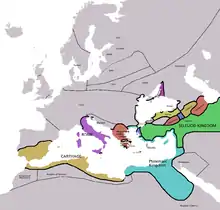220 BC
Year 220 BC was a year of the pre-Julian Roman calendar.

Europe in 220 BC.
| Millennium: | 1st millennium BC |
|---|---|
| Centuries: | 4th century BC – 3rd century BC – 2nd century BC |
| Decades: | 250s BC 240s BC 230s BC – 220s BC – 210s BC 200s BC 190s BC |
| Years: | 223 BC 222 BC 221 BC – 220 BC – 219 BC 218 BC 217 BC |
| 220 BC by topic | |
| Politics | |
| State leaders – Sovereign states | |
| Birth and death categories | |
| Births – Deaths | |
| Establishments and disestablishments categories | |
| Establishments – Disestablishments | |
| Gregorian calendar | 220 BC CCXIX BC |
| Ab urbe condita | 534 |
| Ancient Egypt era | XXXIII dynasty, 104 |
| - Pharaoh | Ptolemy IV Philopator, 2 |
| Ancient Greek era | 140th Olympiad (victor)¹ |
| Assyrian calendar | 4531 |
| Balinese saka calendar | N/A |
| Bengali calendar | −812 |
| Berber calendar | 731 |
| Buddhist calendar | 325 |
| Burmese calendar | −857 |
| Byzantine calendar | 5289–5290 |
| Chinese calendar | 庚辰年 (Metal Dragon) 2477 or 2417 — to — 辛巳年 (Metal Snake) 2478 or 2418 |
| Coptic calendar | −503 – −502 |
| Discordian calendar | 947 |
| Ethiopian calendar | −227 – −226 |
| Hebrew calendar | 3541–3542 |
| Hindu calendars | |
| - Vikram Samvat | −163 – −162 |
| - Shaka Samvat | N/A |
| - Kali Yuga | 2881–2882 |
| Holocene calendar | 9781 |
| Iranian calendar | 841 BP – 840 BP |
| Islamic calendar | 867 BH – 866 BH |
| Javanese calendar | N/A |
| Julian calendar | N/A |
| Korean calendar | 2114 |
| Minguo calendar | 2131 before ROC 民前2131年 |
| Nanakshahi calendar | −1687 |
| Seleucid era | 92/93 AG |
| Thai solar calendar | 323–324 |
| Tibetan calendar | 阳金龙年 (male Iron-Dragon) −93 or −474 or −1246 — to — 阴金蛇年 (female Iron-Snake) −92 or −473 or −1245 |
Events
Greece
- Together with fellow Illyrian, Scerdilaidas, Demetrius of Pharos attacks Illyrian cities under Roman protection and leads a piratical squadron into Greek waters. They unsuccessfully attack Pylos, an Achaean town on the Messenian coast, in the Peloponnesus of Greece .
- Scerdilaidas and the Aetolians invade Achaea. With the help of Cynaethan traitors, they attack, take and burn Cynaetha, a town in the north of Arcadia.
- Rome strikes again against the Illyrian pirates starting the Second Illyrian War.
- Demetrius seeks refuge with Philip V of Macedon, who is very resentful of the Roman interference. Rome occupies Demetrius' chief fortresses, Pharos and Dimillos.
- Aratus of Sicyon goes against Aetolian aggression by getting help from the Hellenic League now under the leadership of Philip V of Macedon. In the Social War, the Hellenic League of Greek states is made in Corinth.
- The Gortynians occupy Matala, on the island of Crete.
Seleucid Empire
- With Molon in most of the Seleucid kingdom and taking the title of king, Antiochus III stops a fight to conquer southern Syria from Egypt. Antiochus III instead marches against Molon, defeating and killing him and his brother Alexander on the far bank of the Tigris. Antiochus goes on conquer Atropatene, the north-western part of Media.
- Meanwhile, the birth of a son to Antiochus III and Laodice leads Hermeias to think about getting rid of the king. This is to rule under the name of the infant son. Antiochus finds the plan and has Hermeias killed.
Anatolia
- Antiochus III's commander in Anatolia, Achaeus, got back all the districts from Attalus of Pergamum. Hermeias said Antiochus III wanted to revolt. Achaeus takes the title of king and rules over the Anatolian parts of the Seleucid kingdom.
Egypt
- Arsinoe III marries her brother, King Ptolemy IV of Egypt.
Roman Republic
- During his censorship, the Roman political leader, Gaius Flaminius, builds the Circus Flaminius on the Campus Martius. He also builds the Via Flaminia from Rome to Ariminum (Rimini).
China
- Qin Shi Huang begins a system of tree-lined roads to connect all parts of China. He begins to join regional walls to form the beginnings of the Great Wall (Wan li chang cheng).
Art
- A bronze statue called Gallic Chieftain killing his wife and himself is made (approximate date). A Roman copy after the original statue is today kept at Museo Nazionale Romano in Rome.
- A bronze statue called Dying Gallic trumpeter is made (possibly by Epigonos) (230-220 BC). A marble Roman copy after the original statue is today kept at Museo Capitolino in Rome.
Deaths
- Conon of Samos, Greek mathematician and astronomer whose work on conic sections (curves of the intersections of a right circular cone with a plane) serves as the basis for the fourth book of the Conics of Apollonius of Perga (b. c. 280 BC)
- Molon, general of the Seleucid king Antiochus III who has rebelled against his rule
- Hermeias, the favourite and chief minister of the Seleucid king Seleucus III and, for a short time, chief minister to Antiochus III
Wikimedia Commons has media related to 220 BC.
This article is issued from Wikipedia. The text is licensed under Creative Commons - Attribution - Sharealike. Additional terms may apply for the media files.